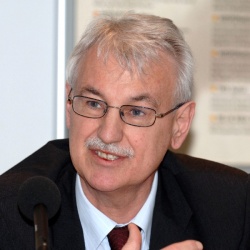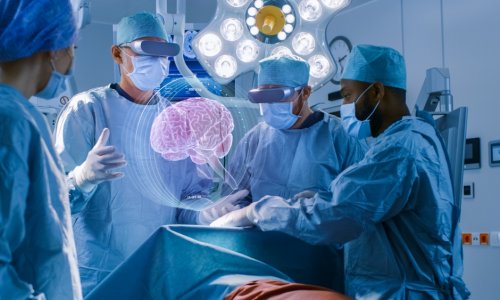An English language programme within the MEDICA Congress
Welcome to the MEDICA Exhibition and Congress!
Every November the exhibition centre in Düsseldorf becomes a beehive of activity for four days, when 17 halls are transformed into the biggest market for medical technology worldwide. The figures speak for themselves: more than 4,300 exhibitors – including the smallest newcomers to the global giants – cover almost 120,000 square metres where they will face thousands among the 136,000 visitors in the next few days. Indeed, over the past 40 years Medica can claim truly impressive achievements – and now comes an English language programme within the formerly all-German language congress.

About 50% of visitors to Medica are from abroad. This year, to help many thousands of these visitors to benefit from expert views on specialties and products, the organisers decided to incorporate an English-speaking programme into the congress programme. During our EH@Medica2009 interview Professor Werner Alfons Scherbaum, President of the MEDICA German Society for Interdisciplinary Medicine, outlined the programme: ‘The six symposia under the slogan Medica International will be held as half day sessions between 10 am and 1 pm on Thursday, Friday and Saturday, and there will be two state-of-the-art lectures on Thursday. There will be five main topics, which tend to stay the same each year. These include imaging procedures, palliative care, future trends in surgery, workflow and procedures as well as individualised diagnosis and therapy. Then, each year these modules have different sub-modules.
‘Whereas the German-speaking congress programme predominantly aims to provide continuing medical education for participants, the English programme modules are much more closely linked to developments in the industry. It’s an integrative model. We basically deliver the more detailed background of the innovations shown at the exhibition.
‘Medica is such a big magnet for specialist visitors mainly because it showcases the trend-setting developments in medical technology. We are seen as a mirror image of the world market. This is where long-term financial strategies on healthcare are decided -- where developments for large investments and international business cooperation are initiated. With our new congress concept we offer a platform for communication and information alongside the sales platform of the exhibition.’
‘In that case, what role do the companies actually play? ‘As a congress we obviously preserve our independence. It’s not all about winning over the manufactures as sponsors. However, we know that most specialist visitors look for very concrete answers to very concrete questions on individual products, which is why our expert lectures are short and to the point: half an hour each. The lecturers begin with a short introduction on the subject and problem, deliver a prognosis as to what direction developments are likely to take and subsequently report on which companies already offer which respective products, where these products should be ranked in a comparison with the competition and at which stands the products can be seen.’
Are the English language sessions open to all? ‘Participation in the entire Medica Congress is possible with a valid admission ticket for the Medica exhibition. Our international format will certainly appeal in particular to decision-makers as well as consultants and specialists familiar with the subject matter.’
The future
‘We would like to expand the English programme and extend it to the afternoons. However, initially we are planning a detailed analysis of feedback received from this year’s participants. We are keen to keep the events fairly small, with around 100-150 participants per seminar. After all, these are very specialised subjects, which we are addressing in a format that will appeal to our target group of buyers and Medica exhibitors. It is therefore not a programme with which we aim to attract the majority of Medica Congress visitors. Overall, the concept has been designed so that participants do not need to attend the congress all day. They can quickly switch between the congress and the exhibition, enabling them to extract information from the event that is of most relevance to them, because there are just so many other things to see at Medica.
18.11.2009









